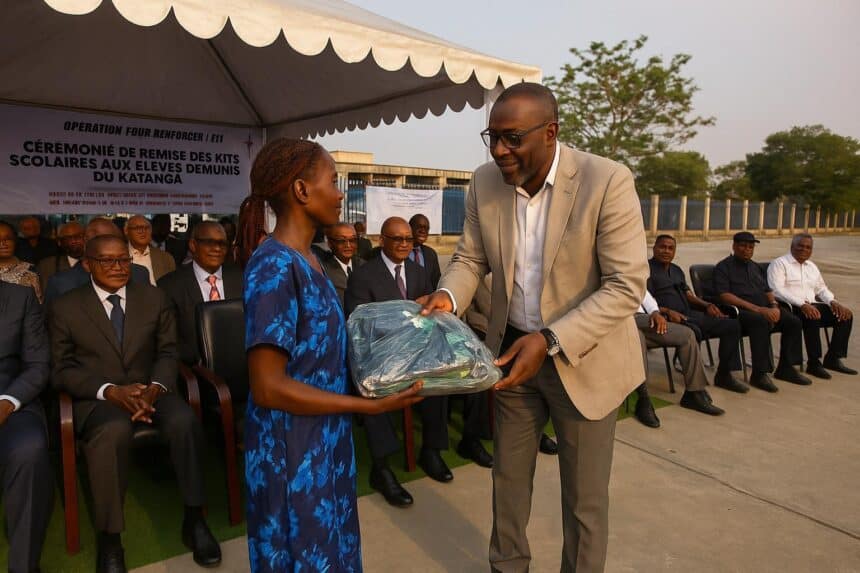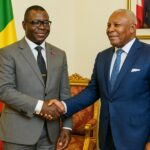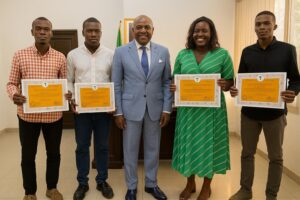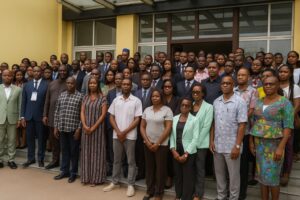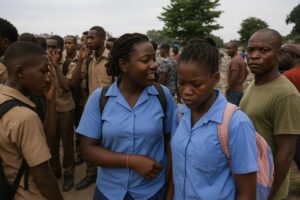Talangaï schoolchildren receive hope-packed bags
On Sunday 1 October, three hundred boys and girls from the sixth arrondissement of Brazzaville, Talangaï, walked away from the district hall with brand-new school bags. Inside: pencils still smelling of factory ink, notebooks gleaming white, and the promise of a school year without worries.
The donation came from the Privat Frédéric Ndéké Foundation, a local charity created by businessman and municipal councillor Privat Frédéric Ndéké. In front of parents, teachers and neighbourhood leaders, he insisted that “no child should feel different on the first day of class”, drawing warm applause.
Equal start the core message
Rising prices have stretched family budgets across Brazzaville. In Talangaï, where many households rely on informal commerce or daily labour, purchasing a full set of supplies can swallow a week’s income. The foundation designed the distribution to close that gap at the critical back-to-school moment.
“Our happiness is seeing these children enter the classroom with the same assets and privileges as their classmates,” Ndéké told reporters, echoing figures recently highlighted by the Congolese radio network RCB that link adequate equipment to better attendance and exam performance.
What the kit contains
Each beneficiary received a sturdy backpack filled with twelve exercise books, a mathematical set, pencils, pens, colouring crayons, a ruler, an eraser, an ardoise for dictation, chalk sticks and even a solar calculator—items selected after consultations with local teachers.
“We made sure the list meets the national curriculum,” explained primary-school director Marie-Odile Lokando, who helped to package the materials. She believes the calculator will be particularly helpful for girls, who often shy away from mathematics when they lack the right tools.
Young voices promise results
Spokesperson Belinda Molenguetou-Koumou, 13, spoke for her peers: “Despite the hard times our parents face, the foundation gives us a chance to continue.” Her vow—“We will not disappoint you”—earned cheers and created an instant social-media buzz on pages covering Talangaï news.
Parents such as market vendor Armand Mabiala felt relief. “My two sons start CE2 next week. I had bought only one notebook so far,” he confessed. With the kits, he can redirect savings toward transport and school lunches, critical for daily punctuality.
A tradition dating back to 2007
The September giveaway has become an annual ritual. Since 2007 the Privat Frédéric Ndéké Foundation says it has handed out more than 7,000 packs across the arrondissement, focusing on orphans and children of single-parent households identified by street-level associations and school counsellors.
Local paper Les Dépêches de Brazzaville routinely covers the event, describing how the initiative complements government programmes such as the free primary-education policy. Ndéké insists the goal is partnership, not substitution: “When civil society and public authorities pull in the same direction, success follows.”
Education challenges in Talangaï
Ministry of Primary and Secondary Education data show Talangaï’s enrolment rate surpasses 85 %, yet drop-out spikes in the final years of primary when costs rise. Analysts at the Centre for Social Research attribute nearly half of premature exits to the inability to buy materials.
By cushioning those costs, foundations like Ndéké’s help the national push towards universal basic education, a pillar of Congo’s 2025 development plan unveiled by President Denis Sassou Nguesso. The Talangaï mayor’s office applauded Sunday’s gesture as “aligned with municipal priorities”.
Funding and transparency
Asked about finances, Ndéké explained that the kits are funded through private donations and proceeds from an annual charity golf tournament held at the Mpila course. An external accountant certifies the books, and summary reports are emailed to donors, a practice praised by the Congolese Network of NGOs.
Transparency builds trust. “Knowing where the money goes encourages more giving,” noted economist Gisèle Tchindé, contacted by phone. She believes clear reporting could inspire other business leaders in Brazzaville and Pointe-Noire to adopt similar back-to-school drives.
Call for wider solidarity
Ndéké was frank: “Three hundred kits are not enough.” He invited churches, sports clubs and alumni associations to replicate the model. Within minutes, members of the Talangaï Taxi Drivers’ Union pledged to cover school transport for twenty beneficiaries during the first trimester.
Sociologist Blaise Okemba views such snowball effects as vital. “Small gestures amplify when communities coordinate,” he observes. The upcoming National Volunteer Day on 5 December could serve as the next milestone, with several youth groups already planning stationery collections.
An example for the new school year
As pupils adjust shoulder straps and parents breathe easier, the Talangaï distribution offers a snapshot of constructive citizenship in action. With classes reopening this week, the kits symbolise more than notebooks; they embody collective faith in education as the surest route to opportunity.
Teachers will monitor the impact. “We expect fewer absences linked to forgotten supplies,” said inspector Mathurin Kouassi after checking the kits. Should results confirm expectations, the district intends to integrate the foundation’s distribution calendar into its official back-to-school planning.

